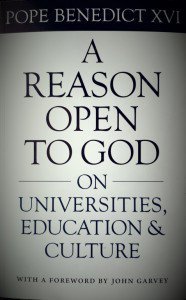One of the most edifying books I’ve read in recent weeks is a compilation of addresses on education given over the course of Pope Benedict XVI’s pontificate: A Reason Open to God: On Universities, Education and Culture. It should be required reading for all Catholics involved in education and formation. The speeches were given to university students and/or professors during official visits to various countries, or in Rome, when students from around the world visited Pope Benedict at the Vatican.
 One can tell by reading these thoughtful addresses that Benedict has cultivated a lifelong passion for research and study. I sorely miss his profound insights on culture and a host of other topics, which were always brilliant and delivered with great care. In one of his talks, he paints a wonderful picture of Pope Pius XII. It’s hard to read this and not see a profile of Benedict himself.
One can tell by reading these thoughtful addresses that Benedict has cultivated a lifelong passion for research and study. I sorely miss his profound insights on culture and a host of other topics, which were always brilliant and delivered with great care. In one of his talks, he paints a wonderful picture of Pope Pius XII. It’s hard to read this and not see a profile of Benedict himself.
He [Pius XII] was contrary to innovations; he wrote each discourse with the maximum care, weighing each phrase and each word before pronouncing in public.
Here are some recurring themes in Benedict’s addresses on education and culture:
- The world, including man, is governed by logos/reason: Benedict XVI explains how Logos/Reason has a human face in the Person of Jesus Christ. Profound implications for mankind flow from this truth. “The universe itself is structured in an intelligent manner, such that a profound correspondence exists between our subjective reason and the objective reason in nature.” (p.182) “Is it really pointless to wonder whether the objective reason that manifests itself in nature does not presuppose a creative reason, a Creator Spiritus? (p.223)
- Man’s transcendent nature because of Logos: “The novelty of Christian proclamation is that it can now say to all peoples: he has revealed himself. He personally. And now the way to him is open. The novelty of Christian proclamation does not consist in a thought, but in a deed: God has revealed himself. Yet this is no blind deed, but one that is itself Logos–the presence of eternal reason in our flesh. . . . Creation is rational.” (p.235)
- Science is purified, not constrained by faith: “Science, moreover is unable to work out ethical principles; it can only accept them and recognize them as necessary to eradicate its potential pathologies. In this context, philosophy and theology become indispensable aids that must be placed along science in order to prevent it from proceeding on its own down a twisting path. . . .” (p.34) “Science and faith have a fruitful reciprocity, an almost complementary need for understanding the real. . . excluding the question on God from scientific discussion, determines the decline of thought and the enfeeblement of the ability to understand this reality. (p.263)
- “Circle of knowledge”: “Faith’s recognition of the essential unity of all knowledge provides a bulwark against the alienation and fragmentation that occurs when the use of reason is detached from the pursuit of truth and virtue. . . .” (p.48) “Blessed John Henry Newman spoke of the ‘circle of knowledge’ to indicate that an interdependence exists between the different branches of knowledge; but God is he who has a relationship only with the totality of the real; consequently, to eliminate God means to break the circle on knowledge.” (p.85)
- Study and prayer go together: “For education and Christian formation, therefore, it is above all prayer and our personal friendship with Jesus that are crucial: only those who know and love Jesus Christ can introduce their brothers and sisters into a living relationship with him.” (p.155)
- Hazards of technology detached from ethics: “Technology, when it reduces the human being to an object of experimentation, results in abandoning the weak subject to the arbitration of the stronger. (p.210)
A short post cannot do adequate justice to such an excellent book as this. There is so much more packed into this collection of Pope Benedict’s addresses than what I’ve extracted here. Order a copy!

